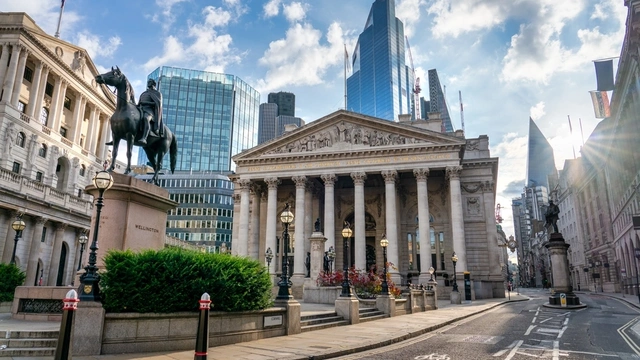The Bank of England base rate has been reduced three times since last summer - from 5.25% to 5% in August, and then down to 4.75% in November, with a further reduction on 6th February 2025 to 4.5%. Let's find out what this means for you.
What is the Bank of England base rate?
The Bank of England base rate (or Bank Rate) is an interest rate set by the Bank of England. This is the rate that the Bank will offer other banks that hold money with them. The Bank Rate is one of the main things that affect the interest rates that those banks pay on savings, or charge for borrowing money.
For example, if the Bank Rate goes up, then banks will usually increase interest rates on borrowing and savings. This can make it more expensive to borrow money, but your savings accounts might pay more. If the base rate goes down, then banks will typically lower their rates. But they won’t necessarily change by the same amount as the Bank Rate.
Why does the base rate go up and down?
The Bank of England increases and decreases the base rate in order to control inflation, with the aim of keeping it at 2%. Currently it stands at 2.5%.
Inflation is the rate of price increases over a set amount of time. For example, if a loaf of bread costs £1.00 but a year later costs £1.05, then annual bread inflation is 5%.
When prices are rising quickly, it means inflation is high, and your money doesn’t stretch as far. The main way that the Bank of England can bring inflation down is to get people to spend less. They do this by increasing the base rate, which makes different types of borrowing (like credit cards, loans and mortgages) more expensive.
The idea is that when people borrow less and spend less, demand for products and services will go down. As a result, prices rise more slowly (sometimes they even reduce), and inflation gradually decreases.
What has happened to UK interest rates?
We saw interest rates skyrocket at the start of the cost-of-living crisis. In November 2021, the base rate was just 0.1%. The Bank of England gradually increased this to 5.25% by August 2023. They kept it at this rate for 12 months, in an effort to cut down on spending and squash inflation.
Following a reduction in inflation, the base rate has been reduced and currently stands at 4.5%.
Although these are good signs, Bank of England governor Andrew Bailey says: “We'll be monitoring the UK economy and global developments very closely and taking a gradual and careful approach to reducing rates further."
You can check The Bank of England’s website to keep up to date with the latest stats.
How changes to the base rate affect you
How base rate changes affect you depends on if it goes up or down, and what you’re doing with your money.
Borrowing money
When the base rate decreases, banks and lenders tend to reduce the interest rates they charge on loans and mortgages. This can make it cheaper to take out finance. But if the base rate increases, then so will the interest rates banks charge. Mortgages are particularly affected by changes to the base rate, so changes are a big deal for homeowners.
For example, if you are on a tracker mortgage that tracks the base rate, then a decrease in Bank Rate will mean a drop in your monthly mortgage repayments.
But if you’re on a fixed rate mortgage, then the interest you pay will stay the same until the end of your fixed rate period. At this point, it might be worth looking around to see if you can get a better deal.
Saving money
Banks also tend to review the interest rates they pay on savings after there has been a change to the base rate.
When the base rate goes down, interest rates on savings accounts usually decrease too, to encourage spending. And when the base rate goes up, savings interest rates often do the same, to encourage saving. This means that if you have money to save, then a higher base rate is good news for you.
While your bank may automatically adjust the interest rate on your savings account(s) when the base rate changes, they might be offering better rates on new accounts. It’s always worth shopping around to see if you could earn more interest elsewhere.
Bear in mind, if you have a savings account with a fixed rate, then the interest you earn won’t change. And you may be charged a fee if you remove your funds before your account matures.
Spending money
Changes to the base rate don’t have an immediate impact on the prices we pay in the shops. It’s more of a slow burn – the result of reducing the amount we spend by making borrowing more expensive and saving more appealing.
In fact, for now, you may still notice prices going up – albeit at a slower rate than they were at the start of the cost-of-living crisis. This is because inflation is still above zero.
Our take
Recent years have been, and still are, difficult for many. The Bank of England’s strategy of raising the base rate to tackle this by reducing spending hasn’t meant just skipping a few treats here and there. People are having to go without essentials.
But the fact that the Bank of England has chosen to reduce the base rate in recent months should give us all hope. The plan seems to be working, although it’s difficult to predict if interest rates will continue to fall, and any further changes are likely to be gradual.
If you need some “thinking outside the box” ideas to cut costs further, our blog is full of tips to help make your money go further.
Adele is a personal finance writer with more than 10 years in the finance industry behind her. She writes clear and engaging guides on all things loans for Ocean, as well as contributing blogs to help people understand their options when it comes to money.
![Email icon]()
Become a money maestro!
Sign up for tips on how to improve your credit score, offers and deals to help you save money, exclusive competitions and exciting products!
Find this useful? Share it with others!









